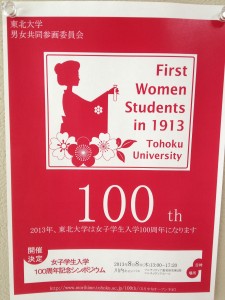blogging expectations life in Japan personal university
by sendaiben
4 comments
Women in Japan
I just saw this poster in my building commemorating the fact that 100 years ago in 1913, Tohoku University was the first university in Japan to admit women as students. I didn’t know that, and I am quite pleased to be working at such a progressive place (here’s hoping they’ll be progressive enough to allow me to stay on past my initial contract LOL).
This is interesting to me in two ways:
1) has women’s place in Japanese society really improved all that much in 100 years?
2) is society going to facilitate women working in the future?
It always struck me as strange that there are such structural and societal limitations on women in a democracy where they make up more than half of the electorate… but I have come to realize that a lot of the obstacles working women in Japan face come from societal expectations, often voiced by other women. Japan seems to be one of the last holdouts of the housewife mother, to an extent that I haven’t seen in Europe of the US. Specifically, I am thinking about how volunteer and community groups (like PTAs, chounaikai, sports team parent groups, etc.) make no efforts to cut working mothers any slack. If anything, they seem to pick on them, at least in my limited experience.
At the same time you get politicians making asinine comments like this and you wonder if things are going to change in the future?
Looking at Japan’s demographic future (the government projects an aging population of less than 100 million by 2050), and lack of plans for mass immigration (this is the government’s focus at the moment, but I can’t see many people applying), women seem to be the economy’s last shot…
And yet women seem to have expectations of men that are becoming increasingly unrealistic, at least according to the small sample in the link. This has been mooted as one of the main contributing factors to the low birth rate -after all, if you don’t have enough money to get married, you probably aren’t going to be having children either (or at least one would hope so).
What do you think? Is Japanese society supportive of women choosing what to do in life? Can you see it changing in the future?
Subscribing
Please consider subscribing to email updates using the box on the top right: you will receive new posts (and new posts only) by email.
You can also subscribe by ‘liking’ the sendaiben.org page on Facebook.
Admin blogging curriculum extensive reading language courses online resources university video
by sendaiben
leave a comment
And now for something completely different
I really enjoyed writing and discussing last week’s educational reform posts. You can see my thoughts on elementary school English, on junior high school English, on senior high school English, and on university English here.
I will probably return to the topic (it’s one of my deep interests) but for now we are going to go back to the usual eclectic mix of teaching topics. Next up (hopefully on Monday) I will be posting a video of the first session of my extensive reading class at Tohoku University. It will include all the orientation material as well as an explanation of what ER is and how we approach it in our program.
Should be useful to teachers using ER in their classes and especially for teachers that are considering it. Stay tuned 🙂
blogging curriculum EFL ES expectations high school junior high school public policy teaching university
by sendaiben
leave a comment
I have a dream… for Japan’s English education
I was very negative about the Japanese government’s proposal to use TOEFL to screen university applicants. It’s easy to criticize, to offer up reasons why things won’t work. It makes you feel important, contributing to the conversation in that way. It even feels productive sometimes, like you are saving people from making mistakes.
I still think indiscriminately imposing the TOEFL test on students in Japan is a flawed idea, and next week on this blog I am going to offer up some alternatives.
I will post my suggestions on how I think English education in Japan can be improved at the primary (elementary school), secondary (junior and senior high school), and tertiary (university) levels.
And then you can all have a go at criticizing me 🙂
* give yourself a pat on the back if you know who the guy in the picture is
Update
Just a really quick post today to let you know what I’ll be doing for the next couple of weeks.
I have a couple of videos to post (my online resources talk ver1.1 and today’s talk on university English education) that will be going up tomorrow and Wednesday. I’ve also got a couple of articles I have almost finished, and then I’ll be presenting at the Tohoku (Sendai) ETJ Expo this Sunday so will post briefly about that. Looking forward to seeing lots of familiar faces there.
I’ve also got a few reviews that are quite overdue. Basically expect to see some more content over the next few days.



